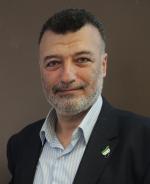Surgeon Channels Medical Solutions and Education to War-torn Syria
April 10, 2017

The future of that hospital, he observed in a subsequent email, is uncertain. Aleppo, which had been in the nongovernment democratic “free zone,” fell to the Russian-backed Assad regime in December. Now under the regime’s control, the hospital is not functioning and the entire city, Hariri added, has been evacuated since December. “The whole area is empty. We have no idea about the hospitals,” he remarked. But “the Assad regime is still targeting health facilities in [democratic] opposition-controlled areas.”
Dr. Hariri plans to resume his surgical work there later this spring. For now, he remains at the Harvard Humanitarian Initiative and as a fellow at Harvard University’s Scholars at Risk program. In that setting, he writes about his trauma care research and secures resources from universities and NGOs to foster medical education and practice in his homeland.

In Professor Nagurney’s class, which frequently explores improvised solutions to disaster-compromised networks and supply chains, Dr. Hariri’s challenges before Aleppo’s fall stood apart. That’s because his own hospital and other medical facilities in the former Aleppo “free zone” were themselves made-to-order targets for aerial bombings. “Last year was our most dangerous with 14 strikes targeting my hospital,” he told the students, illustrating a strike through CCCTV video feeds that depicted exploding and imploding medical practice rooms.
Supply vehicles and even ambulances, he noted, were targets as well. A makeshift solution for the latter: cover yellow-roofed ambulances with mud; they’ll be harder to identify from the air. And to camouflage hospitals—relocate underground beneath abandoned buildings (and in the countryside, consider caves).
Like other “free zone” hospitals, Hariri’s had to do more with less. Its medical supplies, he continued, entered the country from the south through Jordan and from the north through Turkey. Inside Syria itself, supply routes frequently shifted and the cost of supplies inflated with scarcity and the changing turf of combatants. Every hospital, he noted, has its own blood supply and at least three generators, frequently powered by diesel fuel in part extracted from recycled plastic bags.
“My emergency room [was] smaller than this [30-student] classroom. We ran it with three surgeons and two nonsurgeons,” he told the students. “Almost 90% of our patients were IDPs (i.e., internally displaced persons.) More than 50% of our nursing staff [were] volunteers,” he continued. The hospital’s intensive care unit, he added, was frequently a “nightmare,” performing ten surgeries a day.
In a six-week visit to Aleppo 2013, David Nott, a London-based war surgeon, helped Hariri to expand his skill-set from general surgery to more specialized cardiac, vascular, and thoracic operations. Nott also advised Hariri and his colleagues on the critical craft of telesurgery.
Emphasis on Education
Hariri is principal driver of the underground Free Aleppo University Medical School, which draws heavily on teletraining from the United States. “We currently have more than 500 medical students in Syria studying in preclinical stages. Half of them are women,” Hariri remarked. “All of them study on mobile phones because they don’t have laptops. With help from Harvard, SUNY Albany, Yale, and other universities, I’m building a teletraining curriculum.
“There’s no way [for the Syrian government] to filter [our] access because it’s satellite based,” Hariri continued. “We have our own dish and depend on simcards. The best help you can give us is through education,” he emphasized. “It is our best chance to improve medical delivery and to change the minds of the people. We rely on education, because as doctors, we prefer to treat the disease, not the symptoms.”